Since 2015, the domestic auto market has been sluggish, and the growth rate of production and sales has continued to slow down. It has entered a period of low development. Under the new normal of economic development, the enthusiasm of multinational parts and components enterprises to the Chinese market is gradually “cooling downâ€. After combing the development trend of some multinational parts giants in China this year, it is found that although the market is sluggish, most parts and components companies rely heavily on The strategy of the Chinese market has not changed, and the various investments and localization processes for the Chinese market have not been interrupted.
Cooperative construction is still optimistic about the Chinese market. When the industry as a whole is affected by the “inflection point theoryâ€, the world's leading auto parts suppliers have given the opposite answer. Most of the multinational parts giants continue to rely on China. market.
In February 2015, Jinlong Automobile and the ZF Group of Germany signed a strategic cooperation framework agreement, announcing the formal establishment of the two parties as global strategic partners. The two parties have jointly changed the model of the cooperation between the ownership of Jinlong Automobile Group and ZF in the past. The cooperation between the two parties has entered a higher level and a wider scope, and the resources are focused on developing key technologies to achieve mutual benefit and win-win results.
In April 2015, Bosch Group officially established a new communication service center in Shanghai, which will be officially launched in the second half of 2015, and claims to provide diversified travel solutions and services for Chinese vehicle manufacturers and users. This move is showing that Bosch is optimistic and attaches importance to the Chinese market, and actively deepens after-sales service to seize market share. “A lot of vehicle manufacturers feel that China’s auto industry is a bit 'cooling down'. Is this a bit disappointing, or let us lose the momentum of moving forward? I don’t think so, because in the early days, Europe and America. The region has entered such a normalization stage.†For the prospects of China’s auto market and Continental Group, Continental’s executive board member, China’s president and CEO Kang Ruifan is quite confident.
It is reported that the Continental Group officially announced in June this year that it will jointly invest in Huayu Continental Automotive Brake System Co., Ltd., which will produce brakes based on brake calipers, vacuum boosters and electronic parking brake systems. The concept of the “value chain localization†of the components makes it possible to meet the needs of the market through local production.
The R&D localization process has accelerated the need for multinational component giants to adapt to the development of the Chinese market and to be closer to the needs of consumers. Only by continuously upgrading localization, multinational corporations will gradually shift production, procurement, research and development centers to China to meet the market demand, in order to gain more market share in the Chinese market.
In the past few years, from the construction layout of the production bases of multinational parts and components enterprises in China, the trend of building factories in the fast-growing areas of the automobile industry is clearly visible. Qingdao, Wuhu, Changchun and other places where multinational component giants are intensively built are major domestic automobile industry cluster cities. At the same time, the trend of the eastward shift of the R&D center is also emerging.
Delphi, which is developing the Internet of Vehicles globally, has long been optimistic about the opportunities in the Chinese market. Earlier this year, Delphi partnered with Chinese Internet search engine Baidu to integrate Baidu's "Carlife" into Delphi's next-generation in-vehicle connected infotainment platform. Through deep cooperation with Baidu “Carlifeâ€, Delphi will be able to help users realize the seamless interconnection of vehicles and mobile devices, provide better service and user experience for local Chinese users, and also reflect the strategy of Delphi products local upgrade, further deepening Chinese market.
Coincidentally, the Continental Group continued to deepen local cooperation this year.
At the beginning of July, the mainland officially launched the integrated mechatronics production line invested in the transmission control business unit at the Tianjin plant, which is a new business area for the mainland to enter China. The mainland not only accelerates its investment pace in China, but also deepens its localization development process, and shifts the manufacturing center to the R&D center to improve localized research and development capabilities.
From the actions of multinational parts companies in China in recent years, unlike the previous introduction of products into the Chinese market, or the establishment of localized production plants in the Chinese market, the strategic focus of today's multinational parts companies in the local market is in the Chinese market. Establish a localized R&D center as the main target. It can be said that the deepening of localization development and the transfer of R&D centers has become the choice of many multinational companies.
Technologies such as smart driving will be introduced along with the adjustment of the global automotive market and the upgrading of technology in the automotive industry. Mobile internet, smart driving, and new energy vehicle technologies are beginning to be valued by traditional parts companies, and these technical resources are globally used by multinational parts giants. Integration will definitely have an impact on the Chinese market. This year, Delphi has actively consolidated its leadership in active safety and autonomous driving by acquiring software company Ottomatika and strategically investing in Quanergy, a leader in 3D laser sensing technology. These strategic initiatives will enhance Delphi's Advanced Driver Assistance Systems (ADAS) applications and help accelerate the market for autonomous vehicles.
At the end of July, Delphi spent another $1.7 billion to acquire Hellman Taitong, which is in the field of car networking. The industry believes that the acquisition marks its aggressive entry into the car network this year and will strengthen its position in the electrical systems market. Delphi claims that after acquiring Hellman Taitong, it can provide customers with more highly engineered and customized vehicle networking technology and cable harness management solutions.
As early as a few years ago, Delphi has promoted these technologies in domestic automakers such as FAW and Great Wall. At present, many active safety technologies have also landed on many Chinese auto brands. For example, the Red Flag H7 is equipped with Delphi Adaptive Cruise System (ACC), Lane Departure Warning System (LDW), Collision Mitigation System (CMS), Driver Condition Monitoring System (LKP) and Night Vision System (ANV). Yang Xiaoming, president of Delphi China, said this year that Delphi has been committed to research and development of the three technologies of security, interconnection and green, which have become the appeal of Chinese users. In the next 5 to 10 years, there will be a lot of applications. And its global R&D center has moved eastward to ensure that the latest technologies and products will be applied to the Chinese market in the first place.
The trends of the Steel chips briquetting recycling industry
As a result of machining, a vast amount of metal chips are formed. These metallic chips can be directly pressed into briquettes by using a metal briquetting press and recycled by melting.
Recycling metals also requires less energy than producing new metals. Also conserves natural resources. Recycling conserves diminishing natural resources.
It`s much more affordable to resue the metal chips that you have by building an effective recycling system, using the metal briquetting press to do that, Most companies recycle on the basis that it`s cheaper to do so.
What is the role of a metal briquetting press in Steel chips recycling?
The Metal Briquetting Press Machines increase the value of different kinds of metal chips, loose turnings and swarf by compressing them into near solid, dry briquettes for scrap metal recycling to send to the recycler or feed to the furnace.
The Hydraulic Steel Briquetting Press makes your metal recycling more efficient and profitable.
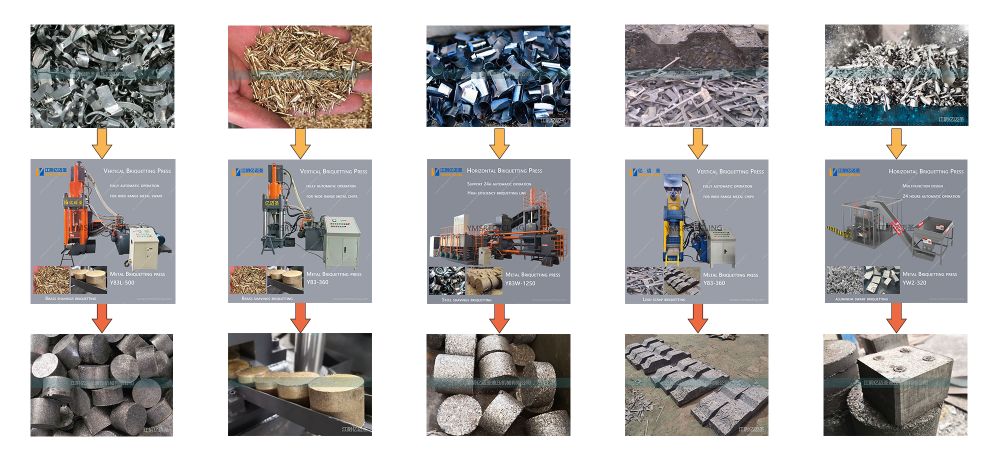
How to choose a suitable metal briquetting press?
The Y83 series metal Scrap Briquetting Press is used to pressing various metal shavings into high-density metal briquettes, which can press various metal shaving materials such as steel shavings, aluminium shavings, copper shavings, cast-iron shavings, bronze shavings and so on.
With high-density compression, compact and strong. Low energy consumption but fast production rate.
The Y83 series hydraulic briquetting press is divided into Y83 conventional structure, Y83L pre-pressing structure, Y83W horizontal structure, YW1 and YW2 horizontal structure.
Y83-Vertical Metal Briquetting Press (Conventional structure)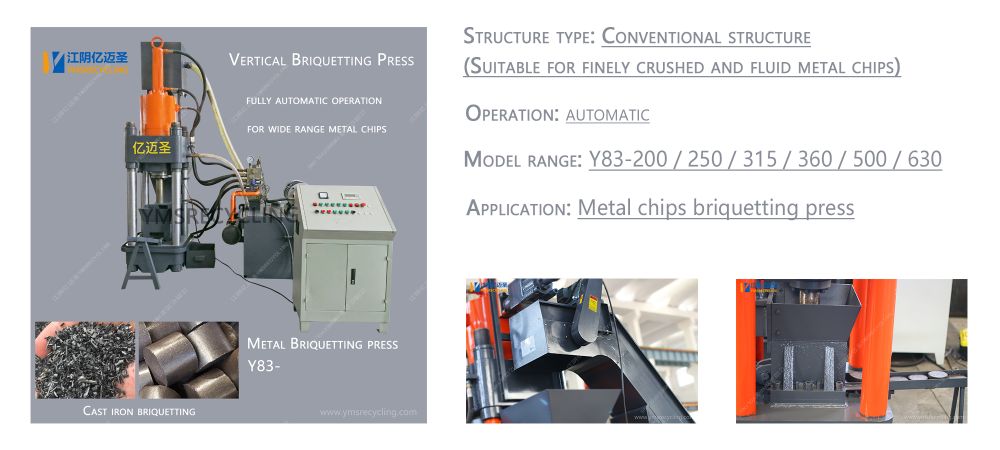
Y83L-Vertical Metal Briquetting Press (Pre-pressing structure)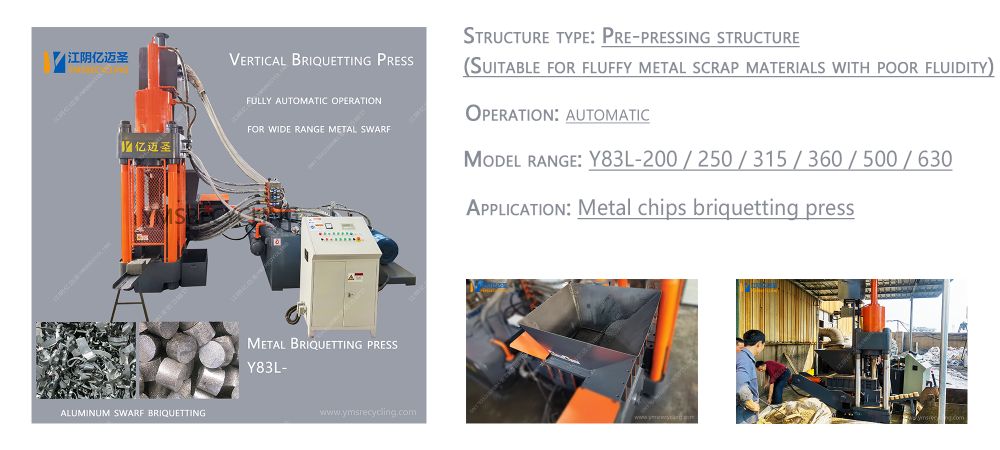
Y83W-Horizontal Metal Briquetting Press (Horizontal structure)
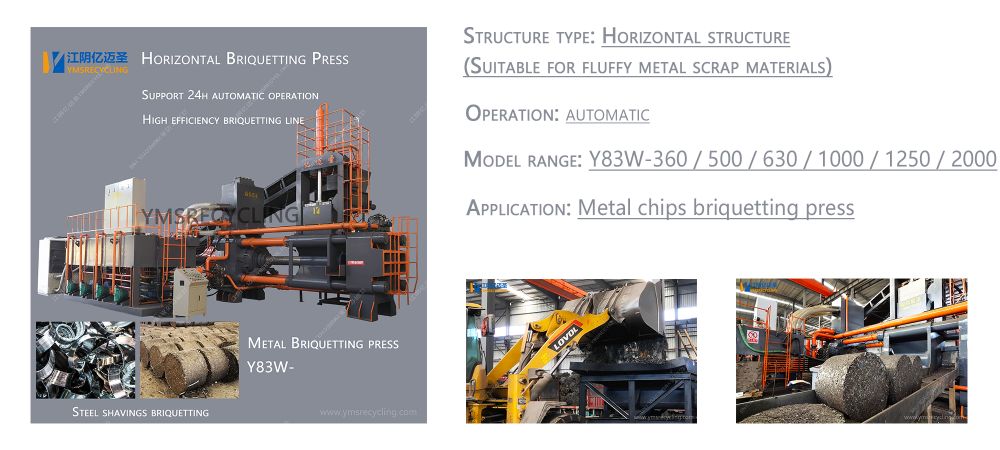
YW1-Horizontal Metal Briquetting Press (Horizontal structure)
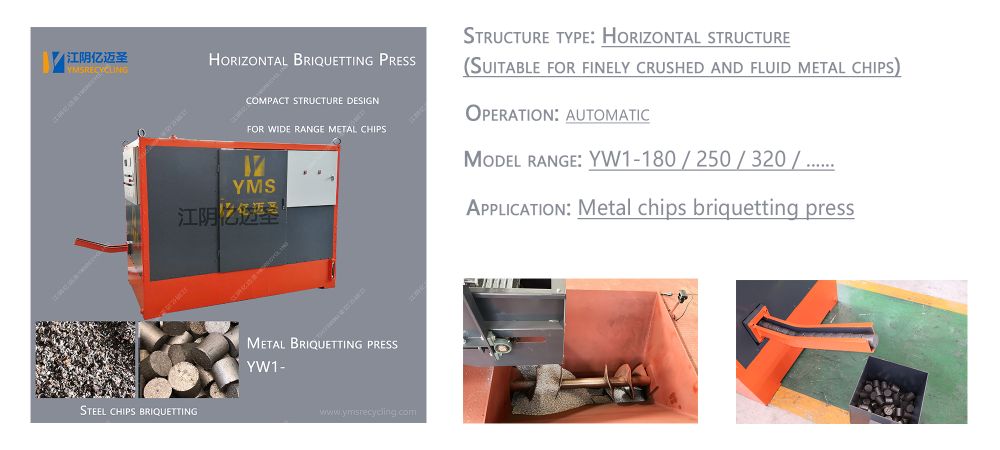
YW2-Horizontal Metal Briquetting Press (Horizontal structure)
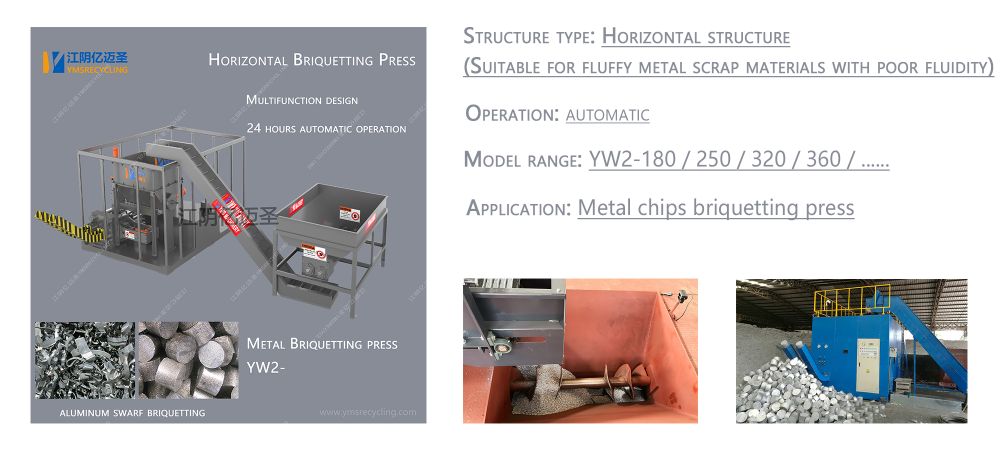
We provide a variety of models of the Aluminum Metal Briquetting press Machine, With new technologies to raise the quality and reduce the price, which supports 24 hours fully automatic working environment.
YMSRECYCLING offer economical and effective solutions to help you to process different metal scraps.
The Automatic Aluminum Briquetting Press can be customized and extended according to the actual needs of your on-site.
CONTACT YMSRECYCLING
Call us now on +86-15950122559
To start maximising your returns from your aluminum metal recycling.
Please email sales@ymsrecycling.com or visit our website directly for further information about the products you are interested in.
Steel Briquetting Press,Steel Briquetting Machine,Automatic Steel Briquetting Press,Steel Metal Scrap Briquetter,Hydraulic Steel Briquetting Press
Jiangyin Yimaisheng Hydraulic Machinery Co., Ltd. , https://www.ymsrecycling.com
